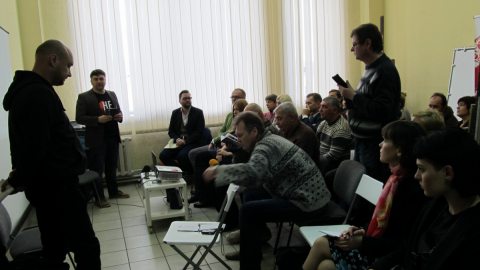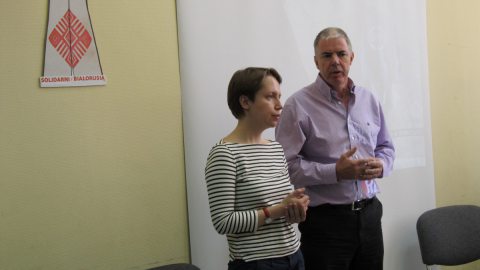International solidarity is important in solving the problem of the death penalty in Belarus
-

- Press-conference of the campaign "Human Rights Defenders against the Death Penalty in Belarus". Minsk, October 9, 2015
October 9 in Minsk, human rights activists held a press conference dedicated to the World Day against the Death Penalty.
The event was attended by the coordinator of the campaign "Human Rights Defenders against the Death Penalty in Belarus" Andrei Paluda, the representatives of the Human Rights Center "Viasna" Ales Bialiatski and Valiantsin Stefanovich, as well as by Liubou Kavaliova, the mother whose son Uladzislau Kavaliou was executed by shooting in 2012, and by the lawyer of the Belarusian Helsinki Committee Hary Pahaniaila.
Among the honored guests there were representatives of the embassies of Great Britain, the Czech Republic and Italy.
Valiantsin Stefanovich told the audience about the global trends concerning the death penalty. To date, 98 countries have abolished the death penalty in law. Together with the countries that do not use this type of punishment in practice due to the moratorium, the number of such countries is 140 out of 192.
"In 2014, Amnesty International noted the reduction in the number of death sentences in the world by 22% compared to year 2013. As for the post-Soviet space, as of 2009 the death penalty in law had already been abolished in countries such as Armenia, Azerbaijan, Georgia, Kyrgyzstan, Moldova, Turkmenistan, Ukraine and Uzbekistan. Tajikistan, Kazakhstan and Russia have introduced a moratorium on the death penalty.
In fact, the world has entire continents free of the death penalty: the European continent (with the exception of Belarus), Central and South America. As for the latter region, the only country where the death penalty is retained is the United States, but the reduction in the number of execution is observed there, too, and 18 out of 50 states have refused from this kind of inhuman treatment of their citizens.”
The topic of the international obligations of Belarus was toughed upon at the press-conference as well. Human rights activist Andrei Paluda drew attention to the blatant cynicism of the state regarding the issue of the death penalty.
"According to the international undertakings the state has no right to execute the death sentences towards the individuals whose communications are pending at the United Nations Human Rights Committee. Nevertheless, such practice persists. The international norms do not stop the firing mechanism. Belarus does not inform its citizens about human rights violations and decisions of the Human Rights Committee. Often relatives of the executed have to struggle on their own and convey this information to state officials and the population.”
Liudmila Kavaliova, the mother of an executed death row convict, Uladzislau Kavaliou, shared her experience with the audience. The woman told that he had to print copies of the decision of the Committee on Human Rights of the United Nations with a list of violations during the case of her son, and distribute them among state officials.
"We distributed these leaflets among lawyers, in courts and prosecutors' offices. Judges sometimes even expressed interest in the topic. The only institution that refrained from any conflict was KGB, which returned us the leaflets,” said L. Kavaliova.
The lawyer and human rights activist Hary Pahaniaila focused his speech on the topic of the missing opponents of the regime and the extrajudicial executions.
"Why does the regime cling to the death penalty? The cases of the enforced disappearances of Yury Zakharanka, Viktar Hanchar, Anatol Krasouski and Dzmitry Zavadski convinced us that the state
had committed extrajudicial killings against them. This is one of the reasons why the state is eager to retain the death penalty – in its presence it can kill its citizens both according to the law and outside its boundaries."
In 2014, representatives of European embassies in Minsk created on a working group on the death penalty in Belarus. Deputy Chief of Mission, Mr. David Spitrd, one of the founders of the group, spoke about the importance of international solidarity in addressing the issue of the death penalty in Belarus and urged everybody to join the group.
"To date, the group consists of 14 members. It's not only representatives of foreign embassies, but also representatives of international organizations such as the Council of Europe, as well as of religious communities. First, the purpose of the group is to comprehend all the difficulties of the death penalty in Belarus, and study its legal aspects. The second major part of our endeavor is providing assistance to those who work in favor of the abolition of the death penalty in Belarus, including human rights defenders, social activists and private individuals. We are ready to talk with everyone who works in this area and to share our experiences."
During the press conference, there were held the presentations of the documentary book "Death Penalty in Belarus" and the animated movie "Pencil and Eraser", which helps to understand the importance of such steps of the civil solidarity as signing the petition for the abolition of the death penalty.
Let us remind that October 10 is marked as the World Day against the Death Penalty. In this regard, human rights activists hold the annual informational and educational Week against the Death Penalty in Belarus from 5 to 10 October. This year, the event was joined by supporters of the abolitionist movement from Lithuania, Poland, Ukraine and Kazakhstan. The Human Rights Center "Viasna" and the campaign "Human Rights Defenders against the Death Penalty in Belarus" urge everyone to join this campaign by signing the petition for the abolition of the death penalty in Belarus.




